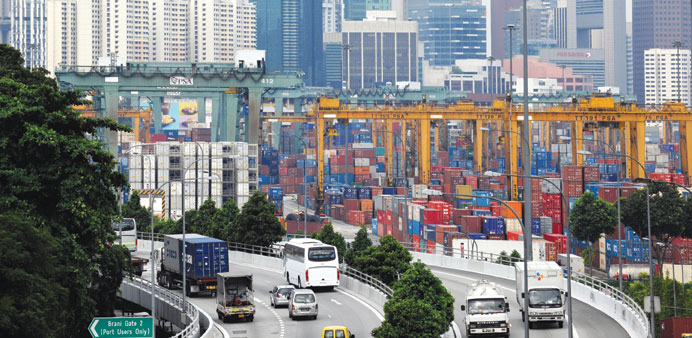Stacked shipping containers at the port stand against a backdrop of the central business district’s office towers in Singapore (file). The city-state is among a growing number of countries that are trying to grab a share of the Islamic finance industry, and regionally it mainly competes with Hong Kong and Malaysia.
By Arno Maierbrugger/Gulf Times Correspondent /Bangkok
The wealthy Southeast Asian city-state of Singapore, known as a major global hub for conventional finance, is seeking to establish stronger trade and investment links between Asia and the Middle East, as well as to participate in Asia’s upcoming, partly sukuk-financed mega-infrastructure projects in a quest to boost its slowly-moving Islamic finance sector. This was the bottom line of a keynote speech by Jacqueline Loh, deputy managing director of the Monetary Authority of Singapore (MAS), held at the 6th Annual World Islamic Banking Conference – Asia Summit in Singapore on June 3.
Loh said that the MAS will “strengthen its Islamic finance regime and capabilities,” having realised that the “increasing wealth accumulation in the Middle East will expand the pool of Islamic funds seeking diversification into foreign investments, and Asia will be a key investment destination for these funds.”
Furthermore, the recently announced tie-up plans between Jeddah-based Islamic Development Bank and China-backed Asian Infrastructure Investment Bank, which is expected to spur the use of sukuk and other forms of Islamic cross-border financing to fund parts of Asia’s huge infrastructure needs, is another sector Singapore wants to get involved. Infrastructure in Southeast Asia will need about $60bn annually until 2022, according to a KPMG study, and Singapore’s role could be “to enhance the bankability of infrastructure projects in the region and involve more capital market participants”, Loh said, adding that “the asset-backed nature of Islamic finance makes sukuk ideal for financing these projects.”
Singapore is among a growing number of countries that are trying to grab a share of the Islamic finance industry, and regionally it mainly competes with Hong Kong and Malaysia. However, while the global Islamic finance industry grew from total assets of $700bn in 2005 to more than $2tn in 2014, and is forecast by financial consulting firm Ernst & Young to reach $3.4tn by 2018, the uptake in Singapore has been rather slow.
Hong Kong already issued two huge $1bn sovereign sukuk, the first one last September and another one just recently in May, and other non-Muslim countries such as the UK, Luxembourg and South Africa succeeded with similar recent sukuk issuances that met particularly strong appetite from Gulf and other Middle East investors. But Singapore’s government has yet to issue its own large-scale sovereign sukuk. Instead, authorities are still working on a framework for regulatory and tax treatment for Islamic bonds and standardisation for sukuk structures aimed at speeding up issuances.
So far, Shariah-compliant financial instruments in Singapore, among them real estate funds, takaful products, wakaf property financing, Shariah-compliant savings and term deposits, have been confined to private banks. They are rather small in size and involved consulting by foreign banks such as Dubai Islamic Bank, Kuwait Finance House, as well as Malaysia’s banking majors Maybank and CIMB.
In 2005, the Singapore government allowed local banks to offer murabaha financing, a move that was followed by the establishment of the Islamic Bank of Asia, the first fully fledged Islamic bank in Singapore. This bank, together with Standard Chartered, was the first to arrange a home-grown sukuk programme in local currency (at a value of S$200mn) through a newly founded entity, Singapore Sukuk Pte Ltd, an MAS subsidiary. These sukuk were in fact a Shariah-compliant form of Singapore Government Securities, the city state’s main debt instruments, and were met with interest from the local, quite sizeable Muslim community, but not so much from foreign investors.
Just a few local companies tapped the Islamic finance market in Singapore since through sukuk or similar finance instruments: Sabana Shariah-Compliant Real Estate Investment Trust, the city-state’s only Islamic REIT; Securus Data Property Fund, the world’s first Shariah-compliant data center fund; Swiber Capital, a service provider for the offshore oil and gas sector, and Parkway Holding, a healthcare service provider and hospital operator, which in 2010 entered into a S$750mn murabaha financing facility, the largest murabaha financing deal in Singapore dollar to date.

